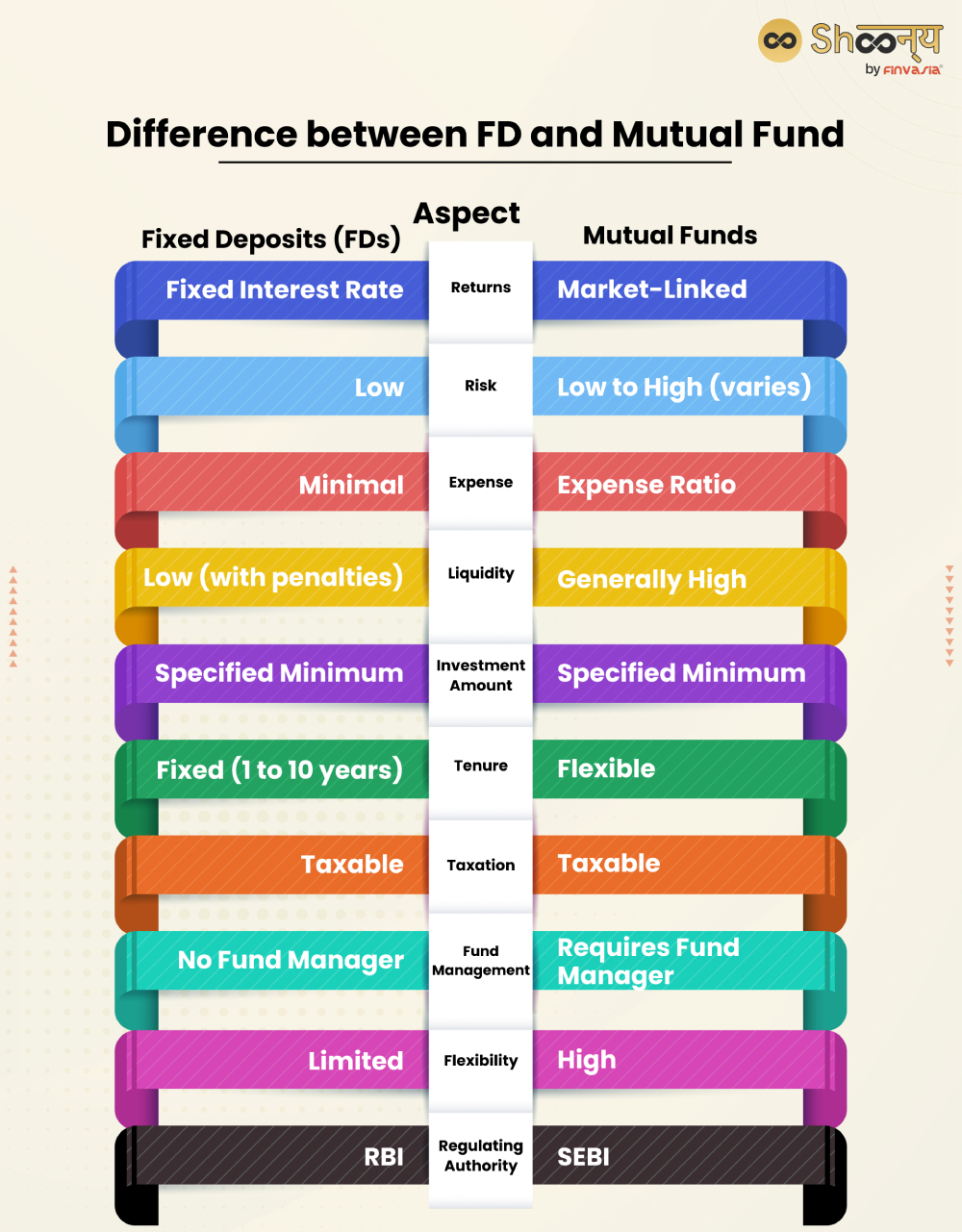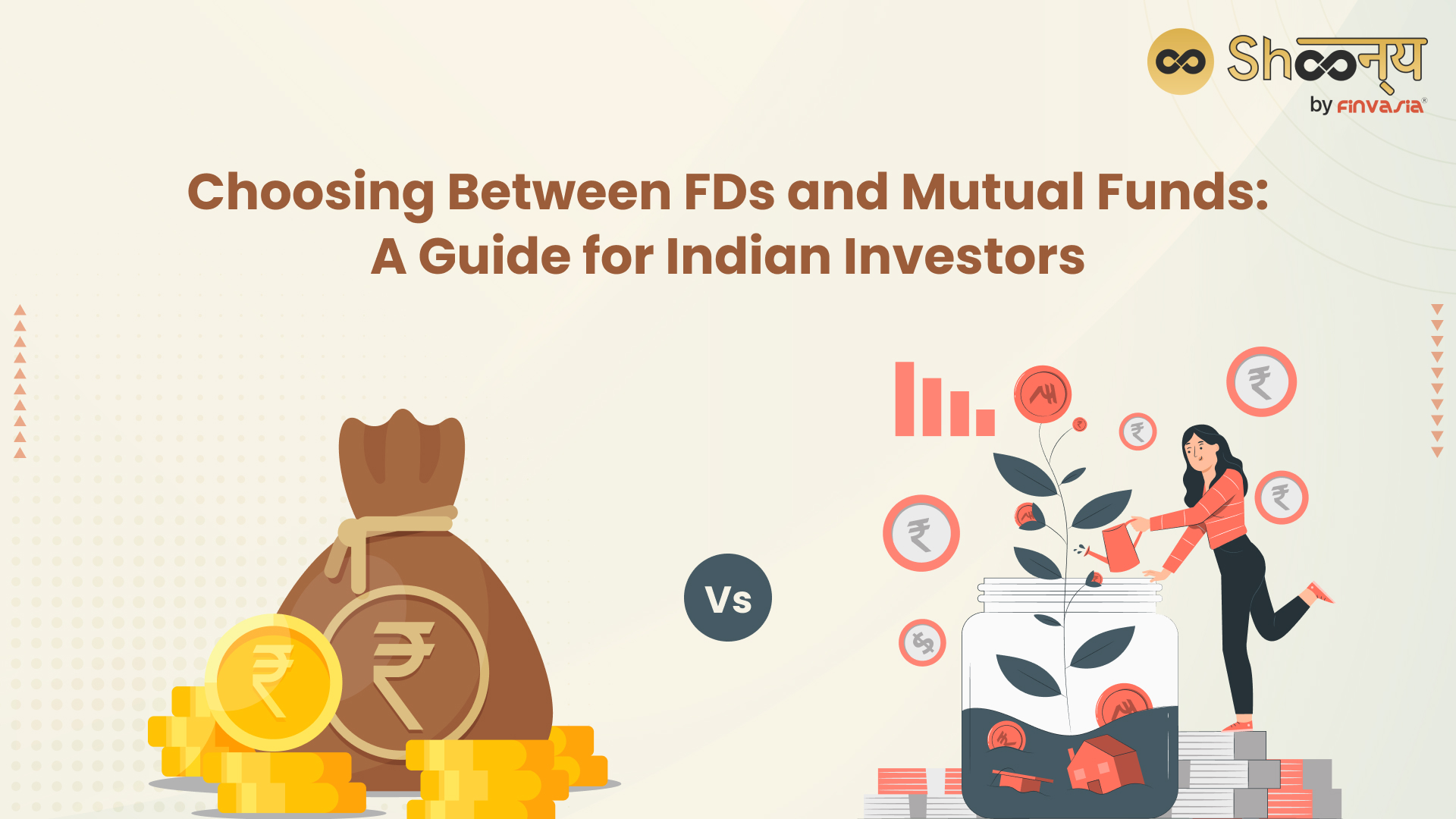Fixed deposits (FDs) and mutual funds stand out as two widely favoured investment choices in the Indian financial landscape. Each boasts its own distinct characteristics and merits, catering to diverse investor profiles. In this article, we embark on a journey to elucidate the fundamental disparities in FD vs. mutual funds, with the aim of empowering you to make a discerning investment choice.
Fixed deposits (FDs) are a traditional investment avenue that has stood the test of time. These instruments are essentially a type of savings account with a fixed tenure, wherein you deposit a lump sum amount with a bank or financial institution. In return, the institution pays you a predetermined interest rate over the fixed tenure, assuring capital preservation and steady, albeit modest, returns. FDs are a go-to option for risk-averse investors who prioritize stability and predictability over potentially higher gains.
On the other hand, mutual funds represent a more dynamic and diversified approach to investing. When you invest in a mutual fund, your money is pooled with that of other investors and managed by a professional fund manager. The fund manager allocates the pooled funds into various asset classes, such as stocks, bonds, or a mix of both, depending on the type of mutual fund.
Difference between FDs and Mutual Funds
Let’s start by understanding the fundamental distinctions between fixed deposits and mutual funds:
Returns
- Fixed Deposits (FDs): FDs offer a fixed interest rate, providing predictable returns over a specific term.
- Mutual Funds: Mutual fund returns are linked to the overall performance of underlying assets, such as stocks, bonds, or commodities, making them market-dependent.
Risk
- Fixed Deposits (FDs): FDs are generally considered low-risk investments due to their fixed returns.
- Mutual Funds: The level of risk in mutual funds varies based on the type of funds. They can range from low to high risk.
Expense
- Fixed Deposits (FDs): FDs typically do not entail additional expenses.
- Mutual Funds: Mutual funds have an expense ratio, covering management fees and operational costs.
Liquidity
- Fixed Deposits (FDs): FDs offer lower liquidity, and withdrawing funds before maturity may result in penalties and reduced interest rates.
- Mutual Funds: Mutual funds generally provide higher liquidity, allowing investors to buy or sell units as needed.
Investment Amount
- Fixed Deposits (FDs): FDs have specified minimum investment amounts, often with no maximum limit.
- Mutual Funds: Mutual funds also have specified minimum investments with no strict maximum limit.
Tenure
- Fixed Deposits (FDs): FDs have fixed tenures, typically ranging from 1 to 10 years.
- Mutual Funds: These offer more flexibility with no fixed tenure; the duration depends on the investor’s preference.
Taxation
- Fixed Deposits (FDs): FD returns are taxable as per income tax criteria.
- Mutual Funds: Mutual fund returns are also subject to taxation based on applicable rules.
Fund Management
- Fixed Deposits (FDs): FDs do not require fund managers.
- Mutual Funds: Mutual funds are managed by professionals who make investment decisions on behalf of investors.
Flexibility
- Fixed Deposits (FDs): FDs offer limited flexibility, subject to penalties for early withdrawals.
- Mutual Funds: Mutual funds provide greater flexibility with various types of schemes to choose from.
Regulating Authority
- Fixed Deposits (FDs): FDs are regulated by the Reserve Bank of India (RBI).
- Mutual Funds: Mutual funds fall under the purview of the Securities & Exchange Board of India (SEBI).

Benefits of Fixed Deposits
Here are some advantages of investing in a fixed deposit:
- Guaranteed Returns: FDs provide a guaranteed return unaffected by market fluctuations.
- Risk-Free: FDs are considered low-risk investments, safeguarding your principal amount.
- Higher Interest Rates: FDs typically offer higher interest rates compared to regular savings accounts.
- Flexible Tenure: You can choose from various tenure options to align with your financial goals.
- Tax Advantages: Tax-saving FDs offer deductions under Section 80C of the Income Tax Act.
Who Should Invest in a Fixed Deposit?
Fixed deposits are suitable for:
- Risk-averse investors seeking stability.
- Senior citizens looking for safe investments with higher returns.
- Individuals with short-term financial goals.
- Taxpayers aiming to save on income tax.
Benefits of Mutual Funds
Consider these advantages of investing in mutual funds:
- Market-Linked Returns: Mutual funds can provide higher returns than bank FDs when the market performs well.
- Beating Inflation: Certain types of mutual funds have a history of outperforming inflation rates.
- Diversification: Mutual funds spread risk by investing in various assets.
- Professional Management: Expert fund managers make informed investment decisions.
- Liquidity and Flexibility: Easily buy or sell mutual fund units as needed.
Who Should Invest in Mutual Funds?
Mutual funds suit:
- Investors seeking higher returns than traditional bank deposits.
- Those looking to diversify their investment portfolio.
- Long-term investors willing to tolerate market fluctuations.
- Taxpayers interested in tax-saving mutual funds (ELSS).
Conclusion: FDs vs Mutual Funds: Which Is Better?
While fixed deposits have been a preferred choice for Indian investors for decades due to their safety, mutual funds offer unique advantages. Mutual funds potentially offer better returns, favourable taxation, and the ability to beat inflation. However, they come with market-linked volatility.
Understanding and tolerating this volatility is essential for mutual fund investors. Start with less risky funds and gradually explore higher-risk options as you gain experience. Ultimately, the choice between FDs and mutual funds depends on individual financial goals, risk tolerance, and investment horizon.
FAQs
Mutual funds and FD have different risk levels. FDs are generally considered safer because they offer a fixed and guaranteed interest rate, and the principal amount is protected up to Rs. 5 lakh by DICGC. Mutual funds, however, are subject to market risks and don’t guarantee fixed returns.
SIPs offer the potential for higher returns but involve market risks. FDs provide stability but may offer lower returns. Your decision should align with your risk profile, investment goals, and tax situation.
Mutual funds and FD have different risk levels. FDs are generally considered safer because they offer a fixed and guaranteed interest rate, and the principal amount is protected up to Rs. 5 lakh by DICGC. Mutual funds, however, are subject to market risks and don’t guarantee fixed returns.
FDs and SIPs have their pros and cons. FDs offer fixed returns but have lower liquidity and tax efficiency. SIPs can provide higher returns in the long term but come with market risks. The better choice depends on your risk profile, investment horizon, and tax situation.
FDs offer safety and stability but may not beat inflation or provide high returns. The suitability of FDs depends on your risk tolerance and investment goals. They can be a good choice for short-term needs.
While FDs are safe, other options offer similar safety with potentially higher returns. These include the Public Provident Fund (PPF), the National Savings Certificate (NSC), and the Senior Citizens Savings Scheme (SCSS). The choice depends on your age, income, and goals.
Investments like mutual funds, equity shares, and gold can offer better returns than FDs, but they come with varying levels of risk and liquidity. The right choice depends on your risk tolerance, investment horizon, and financial objectives.
______________________________________________________________________________________
Disclaimer: Investments in the securities market are subject to market risks; read all the related documents carefully before investing.

